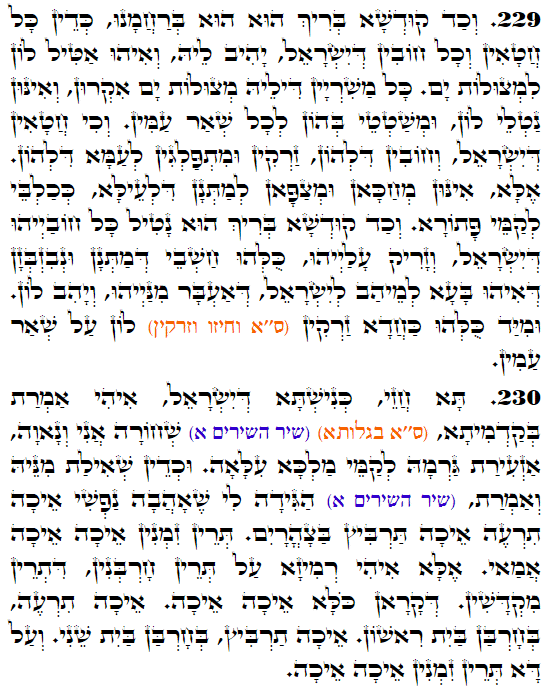Daily Zohar # 3391 – Balak – Where are you?
.
Hebrew translation:
230. בֹּא וּרְאֵה, כְּנֶסֶת יִשְׂרָאֵל הִיא אוֹמֶרֶת בַּתְּחִלָּה (בַּגָּלוּת), (שיר השירים א) שְׁחוֹרָה אֲנִי וְנָאוָה. מַקְטִינָה עַצְמָהּ לְיַד הַמֶּלֶךְ הָעֶלְיוֹן. וְאָז שׁוֹאֶלֶת מִמֶּנּוּ וְאוֹמֶרֶת, (שם) הַגִּידָה לִּי שֶׁאָהֲבָה נַפְשִׁי אֵיכָה תִרְעֶה אֵיכָה תַּרְבִּיץ בַּצָּהֳרָיִם. לָמָּה שְׁתֵּי פְעָמִים אֵיכָה אֵיכָה? אֶלָּא הִיא רוֹמֶזֶת עַל שְׁנֵי חֻרְבָּנוֹת שֶׁל שְׁנֵי בָּתֵּי הַמִּקְדָּשׁ, שֶׁקּוֹרְאִים הַכֹּל אֵיכָה אֵיכָה. אֵיכָה תִרְעֶה – בְּחֻרְבַּן בַּיִת רִאשׁוֹן. אֵיכָה תַּרְבִּיץ – בְּחֻרְבַּן בַּיִת שֵׁנִי. וְעַל זֶה פַּעֲמַיִם אֵיכָה אֵיכָה.
.
Zohar Balak
#229
The Holy One Blessed be He, with mercy, takes the sins of the Israelites and gives to the Sama-l. He cast them into the depths of the sea, which is the aspect of Sama-l forces. They spread it to all nations that look up and wait for gifts from above like dogs by the dinner table. They think that they receive gifts intended for the Israelites.
#230
Songs 1:5 “שְׁחוֹרָה אֲנִי וְנָאוָה בְּנוֹת יְרוּשָׁלִָם כְּאָהֳלֵי קֵדָר כִּירִיעוֹת שְׁלֹמֹה.” “I am dark, but lovely, O daughters of Jerusalem, Like the tents of Kedar, Like the curtains of Solomon.”
When the Congregation of Israel, the Shechina is in Exile, she sees herself as dark because of lack of Light. She asks her beloved King; Songs 1:7 “הַגִּידָה לִּי שֶׁאָהֲבָה נַפְשִׁי אֵיכָה תִרְעֶה אֵיכָה תַּרְבִּיץ בַּצָּהֳרָיִם שַׁלָּמָה אֶהְיֶה כְּעֹטְיָה עַל עֶדְרֵי חֲבֵרֶיךָ.” “Tell me, O you whom I love, Where you (אֵיכָה) feed your flock, Where you (אֵיכָה) make it rest at noon. For why should I be as one who veils herself By the flocks of your companions?”
The Zohar asks why the word ‘אֵיכָה’ appears twice in the verse and explains that they refer to the destruction of the first and second Holy Temples.
Lesson;
Genesis 3:9 “וַיִּקְרָא יְהוָה אֱלֹהִים אֶל הָאָדָם וַיֹּאמֶר לוֹ אַיֶּכָּה.”
“Then YHVH God called to Adam and said to him, “Where are you (אַיֶּכָּה)?”
After Adam and Eve sinned, they realized the negative impact on them. When they heard the voice of God in the Garden, they hid from him. God called Adam saying ‘אַיֶּכָּה’ ‘Where are you?’.
God doesn’t need to ask such questions because nothing is hidden from him. It is like a statement telling Adam that he got disconnected from the Tree of Life.
The first two letters ‘אי’ represent the question ‘where’, and the other two letters ‘כה’ has the aspect of the Shechina that connect the Light to Malchut.
When we study all aspects of the Torah, we are ‘dwelling’ in the Garden of Eden, which is the connection to the Tree of Life. When we lose that connection we are in a form of exile and darkness. In such a state we are exposed to judgments and aspects of destruction.
When your soul asks you ‘Where are you?’ prepare to answer ‘I am here, studying’.
{||}

 Previous: Balak
Previous: Balak

